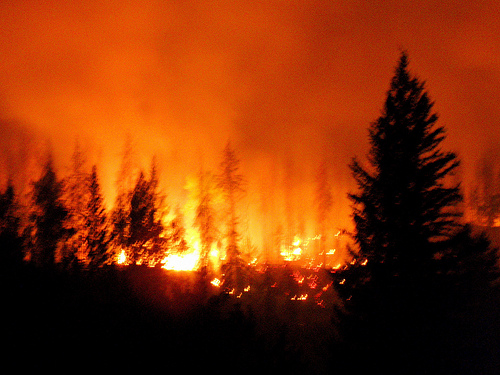By Jeremy Hannaford (Contributor) – Email
Print Edition: June 20, 2012
I remember how much I use to love campfires when I was younger. It was the main reason I wanted to go camping. So when campfires began to be banned from camp sites, I was upset. No more late night stories, no more marshmallow roasting, no more billowing heat. Over the years, I began to realise it was because of all the forest fires up north in the Okanagan area.
I always thought I’d be safe with the fire. I wouldn’t be like those other people. But something tells me that’s what others have told themselves before accidently setting a forest ablaze. Summer hasn’t even fully started yet, but according to BC Wildfire there have already been 32 confirmed forest fires, some starting as early as April. With an estimated 1400 hectares of forest area already burnt, I can understand the Fire Department’s concern for fire safety.
They want to make sure people are safe with all kinds of items that could be a fire hazard in the summer. For instance, according to a Kansas City Fox News, a man was literally set aflame while cooking on his barbeque. An aerosol sunscreen he applied had not been fully absorbed. It was this aerosol sunscreen that acted as a fuel for the flame that burnt his skin.
I spoke with a contact working for a local fire department, and he said he has heard stories of aerosol sun screen and bug spray causing fire risks.
The firefighter, who did not wish to be named and did not want the location of his hall identified, explained the enforcement of the fire bans. He noted that the fire bans are in for a good reason. Due to the heat, everything becomes more dry and brittle. People in the past have not taken the proper precautions when setting up campfires or barbeques. Pine needles, for instance, are scattered all over the ground in common camp sites. With a small breeze, they can fly towards the fire, lighting up like matches.
Some precautions he mentioned for setting camp fires was that it needs to be in a safe location away from trees, embankments and foliage. Also, a bucket of water or a blanket be nearby at all times to put out the flames in case of an emergency. Finally, the firefighter instructed campers ensure that the fire be three-feet in both its diameter and in height. This is a safe size of fire that can be controlled.
The firefighter did urge me to tell everyone to follow the rules and be safe with fire. As mentioned before, people will underestimate the danger small flames can cause. He told me that twice in the past year an entire fire hall has been called out to the scene of a fire, both at chicken farms, each caused by lack of caution and safety. One of the fires raged for 36 hours before it was finally extinguished.
The cost of the fine for not obeying the fire ban is over $200, but I would much rather pay that and learn from that mistake rather than seeing my campsite burn.


